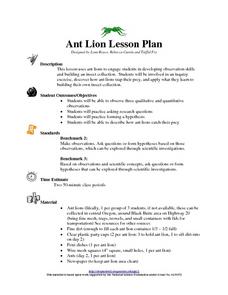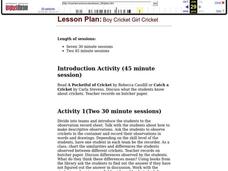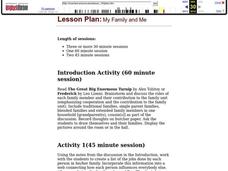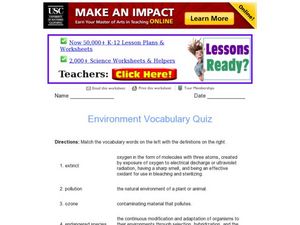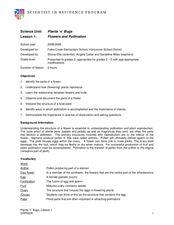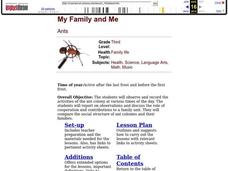Curated OER
Ant Lion Lesson Plan
Students observe three qualitative and quantitative observations. The students further practice the follwoing: asking research questions,forming a hypothesis, and describe how ant lions catch their prey. Students also form hypotheses...
Curated OER
Co-evolution of Plants and Pollinators
High schoolers, while studying the rolls of pollinators and plants, explore co-evolution of mutualistic relationships.
Curated OER
Build Your Own Bug
Students create a unique bug. In this lesson about bugs, students use their imagination to develop a new kind of bug. Students use construction paper, scissors, glue, and crayons to make their bug. Students explore the different parts of...
Curated OER
Boy Cricket Girl Cricket
Students investigate crickets. In this series of cricket activities, students observe and chart crickets. Students discuss the differences between male and female crickets, record findings in a journal, handle crickets, and read a...
Curated OER
Grooming Is A Good Thing
Students construct fly traps, collect house flies, and observe the flies grooming. They compare/contrast the fly's grooming techniques with their own. They develop a good grooming habits chart.
Curated OER
Comparing Minibeasts
For this "Comparing Minibeasts Data Worksheet", students respond to four short answer, one drawing, and eight graphic organizer questions.
Curated OER
Honey Bee Anatomy and Identification
Young scholars examine and dissect a worker honey bee to analyze the structures and functions of honey bees. They draw the structures they see and compare/contrast them to drawings or electron micrographs.
Curated OER
What Bees Eat
Students consider the concept that plants and animals are dependent on one another and role-play the interaction between bees and flowers. They identify crops that are dependent on pollination by bees.
Curated OER
What Bees Eat
Students study plant and animal interdependence by studying bees and pollination. In this interdependence lesson, students discuss flower parts and dissect it to show its reproductive parts. Students then use tissue and pipe cleaners to...
Curated OER
Songs And Stories About Bees
Students study bees. In this nature lesson, students practice a busy bee song, read poems about bees, and discuss the concept of beekeeping.
Curated OER
My Family and Me
Students discuss the family unit and compare it to an ant colony. In this family lesson, students draw their family and extended family and talk about their jobs and family roles. They compare this to an ant colony and observe the work...
Curated OER
Major Functions
Seventh graders investigate the basic characteristics and needs of living things. They identify the major parts of plants and animals by making lists. Students focus upon one living thing and speculate how if one part is changed how it...
Curated OER
Environment Vocabulary Quiz
In this environment vocabulary worksheet, students draw lines to match 13 words to their definitions in another column. Words pertain to the environment. Examples: biosphere, habitat, greenhouse effect, smog.
Curated OER
Flowers and Pollination
Students explore the environment by researching plant reproduction. For this pollination lesson, students define botany related vocabulary terms such as disc flower, petal and fertilization. Students dissect a flower with their...
Curated OER
Forest Ecology
Students examine the different plants and animals in British Columbia. In this forest ecology lesson students explore how ecosystems work, classify animals and investigate food webs and chains.
Curated OER
My Family and Me
Third graders observe and record the activities of the ant colony at various times of the day. They report on observations and discuss the role of cooperation and contributions to a family unit. They compare the social structure of ants.
Other popular searches
- K 2 Life Science Insects
- Science Insects
- Parts of Insects Science
- Life Science Insects
- Science Spiders vs Insects
- Esl Lessons Science Insects
- Esl Science Insects


